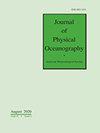报头
IF 2.8
2区 地球科学
Q1 OCEANOGRAPHY
引用次数: 0
摘要
本文章由计算机程序翻译,如有差异,请以英文原文为准。
Masthead
求助全文
通过发布文献求助,成功后即可免费获取论文全文。
去求助
来源期刊
CiteScore
2.40
自引率
20.00%
发文量
200
审稿时长
4.5 months
期刊介绍:
The Journal of Physical Oceanography (JPO) (ISSN: 0022-3670; eISSN: 1520-0485) publishes research related to the physics of the ocean and to processes operating at its boundaries. Observational, theoretical, and modeling studies are all welcome, especially those that focus on elucidating specific physical processes. Papers that investigate interactions with other components of the Earth system (e.g., ocean–atmosphere, physical–biological, and physical–chemical interactions) as well as studies of other fluid systems (e.g., lakes and laboratory tanks) are also invited, as long as their focus is on understanding the ocean or its role in the Earth system.

 求助内容:
求助内容: 应助结果提醒方式:
应助结果提醒方式:


